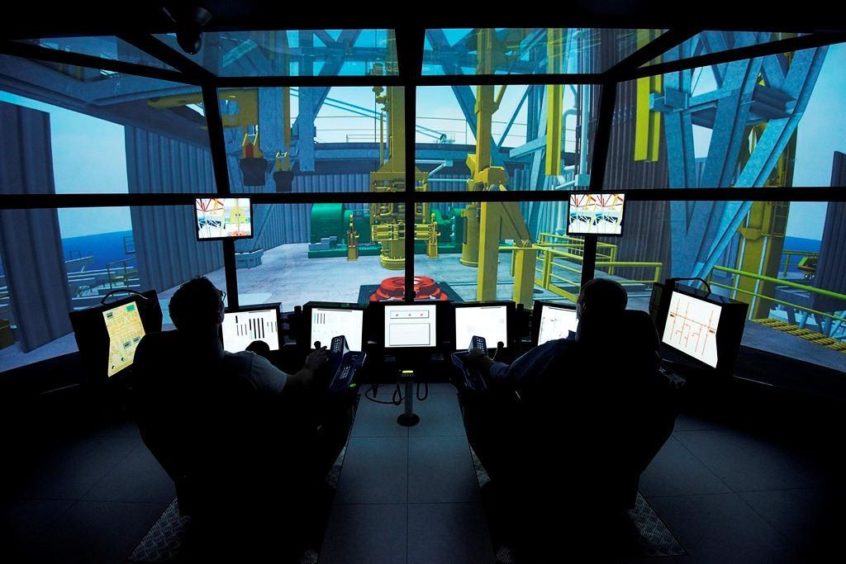
Though nearly a decade old, training provided by Maersk’s Offshore Simulation and Innovation Centre (MOSAIC) complex in Svendborg, Denmark is far from dated.
Continued investment in high-fidelity simulators and expansion of the facility and addition of cloud-based solutions for prolonged learning gives current and future drill crews the invaluable, virtual experience of how their decisions can impact the safety of their asset and the lives of fellow offshore workers.
While these computer-generated scenarios provide hard lessons on the technical aspects of crew resource management, it is the soft skills which can truly aid or abate critical decision-making.
“Focusing on human factors, like communication, situation awareness and leadership, is absolutely crucial,” said Martijn van der Meijs, a senior leadership consultant with Maersk Training.
“Not only to reduce human error, but perhaps even more importantly to enable human beings to effectively recognise changes, risks and challenges in a complex operational environment so they can prevent incidents from happening.”
With signs of recovery on the near horizon – last month, Maersk Drilling reported £525 million in new contracts in the first quarter of 2021, the highest level in more than three years.
Van der Meijs said: “Humans are often the most valuable asset in any organisation or company. You can have the most technologically advanced rig in the world, it is humans that make it work. Drilling operations are often hazardous and complex, so crews need to be trained to work together effectively as a team, aware of their limitations, competent to take timely and qualified actions and decisions.
“To quote Mark Twain: ‘Good decisions come from experience. Experience comes from bad decisions.’ Training in drilling simulators allows people to gain that experience and competence without any operational consequences.”
Simulated training for real world survival
The catastrophic Deepwater Horizon explosion in 2010 compelled the creation of MOSIAC in 2012 to “build competency, not for compliance”. The dome drilling simulator offers a 180o side view and 90o vertical view, as well as pipe-handling and well control training capabilities. It is equipped to perform well control downhole simulations with 3D graphics, thus enabling both highly precise rig and operations-specific challenges, as well as the perfect environment for developing a more resilient drilling team.
Maintaining safe operations, particularly in hazardous environments, is highly reliant on the remote crew receiving, interpreting, and acting together on data from a range of sources often in a challenging, high-pressure, and remote workplace. To take competence to the next level, MOSIAC provides a mix of classroom and simulator training.
Before drill crews can take the controls of a simulator, two days are spent learning about human limitations and enhancing risk perception. This in-depth focus on psychological behaviours, attitudes and actions had been initially scoffed at by drillers but they quickly realise that indecision or inaction can cause or escalate a major incident.
Van der Meijs said: “For some, it’s a wake-up call and puts greater onus and realism to the critical situations our trainees face in the simulators. Without an accurate understanding of such risks, then other non-technical skills, such as situation awareness, communication and decision-making are immediately inhibited.”
Exercises in the advanced drilling simulator, which closely replicates the drillers’ cabin offshore, right down to use of a “cyber” chair, often last several hours. From a mundane task to one which can quickly escalate into a serious well control incident, the outcome depends on the response of the team.
Throughout the training, drillers are monitored and evaluated by the instructors and a thorough debrief explores the actions taken or otherwise and lessons to be taken forward. Van der Meijs said: “The goal here is to embed reflection and continuous improvement, with the inclusion of the human factors, into offshore operations.”
Beyond training, MOSIAC is also undertaking research to more fully understand the nature of human failures in abnormal and emergency situations. This will be used to further enhance the sociotechnical design elements in the simulator system and develop targeted training to enhance drillers’ situation awareness and build a stronger, more holistic safety culture across the energy industry.
Recommended for you

 © Supplied by Maersk Training
© Supplied by Maersk Training